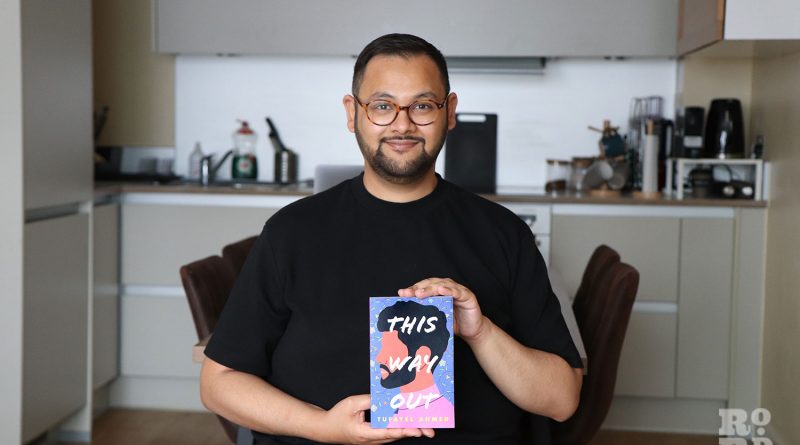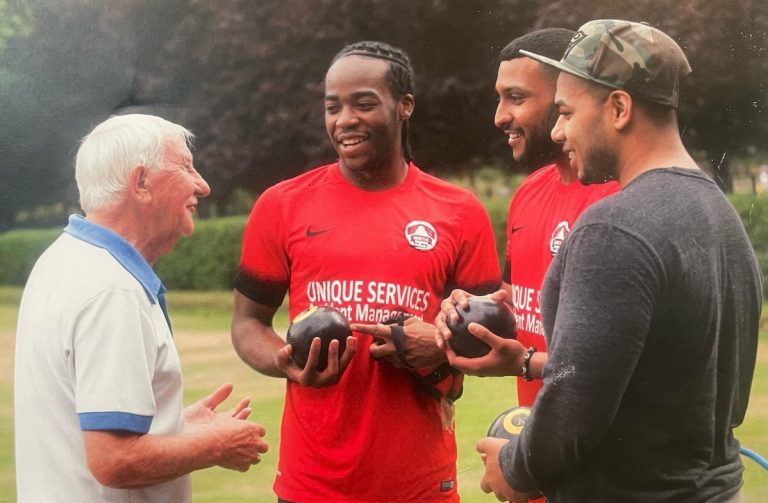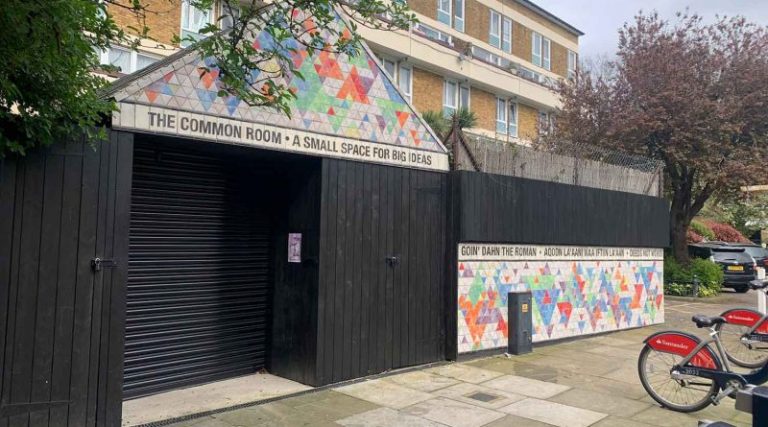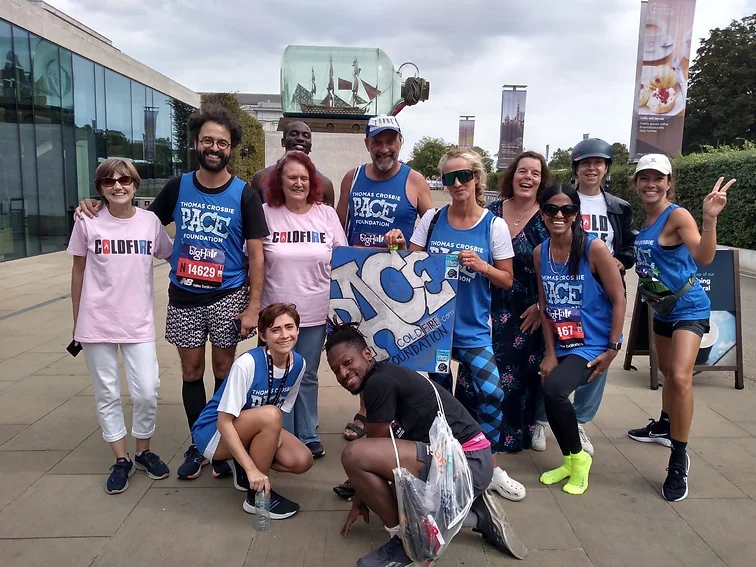‘This Way Out’: East End author Tufayel Ahmed on growing up gay in the Bengali community
Bengali author Tufayel Ahmed speaks about the challenges of growing up gay in the 1990s and how it led to his determination to open up space for other LGBTQ ethnic minorities.
The ‘90s are making a comeback; its fashion, music, and even food are having a renaissance. And it’s easy to see why. It was the decade that gifted us the Spice Girls and their Union Jack dresses, ‘It-Girls’ and celebrity gossip mags, jelly shoes with sparkles, and Nokia 3310s with their infinite number of pop-playing ringtones.
But for all its party atmosphere, others were left outside.
It was the decade that forbade the promotion of queer culture and communities. And this was the era in which the young and impressionable Tufayel Ahmed, a gay Bengali East End man, grew up.
Ahmed and I meet at Victoria Park’s Pavilion Café, the weight of the threatening rain clouds pressing down on us. He has, in tow, Gigi, his talkative Maltese pooch (a lockdown puppy, he concedes), warmly coated in a tartan dog fleece, the type that could be found on a Walker’s shortbread tin. I peer down at Gigi’s four petite legs but he reassures me that they are sturdier than they appear, and can carry her from his flat near Malmesbury Road to Victoria Park and back again.
Ahmed’s warmth is immediate; his wide smile corresponds with his welcoming eyes. Wearing a mid-calf length camel coat, black jeans, black polo neck, and thick-rimmed round tortoiseshell glasses, he is the epitome of a swish and successful urban professional.
A journalist by trade, he has worked in various newsrooms, including The Big Issue, LGBTQ news outlet Pink Times and American magazine Newsweek. He was also a finalist for journalist of the year 2017 at the Asian Media Awards. But, we aren’t here to talk about those achievements, rather, we are here to discuss his debut novel which he wrote during the first lockdown in April 2020.
Ahmed, 33, explains that he ‘spent a good month or so just drafting nonstop, day and night, just writing, writing, writing.’ Such feverish writing resulted in ‘This Way Out’ which focuses on Amar, a 29-year-old gay Bengali man from the East End, who comes out to his family on the group Whatsapp. Not only that, but he tells them he is also getting married to his long-term boyfriend Joshua. The book follows the unravelling of this bombshell to Amar’s conservative Bengali family, who are still learning to cope with the recent loss of their beloved mother.
A zeitgeist book, it deals with a diverse range of weighty topics including class, religion, and even age, but Ahmed has crafted it so that the heavier sections are given levity with humour.
Immediate parallels can be drawn between Ahmed and Amar. So, was this a semi-autobiographical exercise?
Ahmed gives a light chuckle. He concedes there are, indeed, parallels. Both he and Amar were raised just off Globe Road, and both lived in a large second-generation working-class Bengali family. Like Amar’s parents, his arrived into England from Bangladesh in the 1980s, his dad taking a job in the textiles and tailoring industry, and his mum staying at home to look after the family of five children.
Character-wise, Ahmed shares that he and his protagonist both possess ‘nihilistic humour’. Humour, as Ahmed explains, was a ‘huge defence mechanism’ when coping with the difficulties of growing up gay in the 1990s.
Ahmed also, like Amar, had to cope with the death of his mother in his 20s, a part of the book where the sense of loss aches off the pages, and the dark and murky blue depths of sadness Amar, and by association Ahmed, endured is visceral.
But, unlike Amar whose brother effectively disowns him, Ahmed’s sibling relationships are ‘all great, all good’.
Ahmed also never had to declare his sexuality. He says that ‘it was something that really needed to ever be said’, mainly because from a small child, he felt different and his family sensed that. He shares that he didn’t have many friends in his youth; during his time at Morpeth Secondary School, which hugged either side of the millennium, he says quietly that his friends were ‘the other kind of misfits at the time. So, you know, like the Goths, and other people like that.’
Feeling isolated he turned to television for comfort. He was a fan of East Enders, loved Top of the Pops, and a devotee of Buffy The Vampire Slayer (which televised one of only a handful of lesbian kisses in the early 2000s).
But, in addition to this, even if Ahmed wanted to proclaim his sexuality, the law was not on his side. The 1990s was not an era for gay or queer liberation, rather it could be viewed as one of the most oppressive times in recent years for the LGBTQ community. In 1988, the Thatcher government introduced Section 28 of the Local Government Act, a bill that Globe Town famously fought. It prohibited the ‘promotion of homosexuality’. Schools were not able to teach or discuss queer culture, and many charities and organisations set up to support young queer people, closed. Its message was clear; if you do not conform to accepted sexual norms, you are a societal outcast.
Section 28 was outlawed in England and Wales in 2003 but it was within this climate that Ahmed spent his formative years.
Ahmed’s inability to fit into ‘the traditional boxes of a male Bangladeshi Muslim’ imposed upon him willed Ahmed to ‘find his tribe’ and led to the writing of This Way Out.
Speaking in a melodic velvety voice, he says that the book ‘helped solidify where I’m at’. Through exploring Amar’s relationships with friends and family, Ahmed is working on his ‘chosen family’. He reels off his diverse group: ‘I have a Bengali friend, I have an Italian friend, I have a gay friend,’ he trails off, ‘Where I belong, it’s just like my own kind of mishmash’.
Through Amar, he also wanted to represent a different version of queerness, one that hitherto has rarely been projected. Ahmed mentions that while even at Pink News, he felt in the minority. He says he found it ‘very homogenous’, with white, middle-class (many privately educated) gay men dominating the newsroom. ‘I didn’t necessarily feel like I fit into that world,’ because his experience of growing up gay was ‘so different’.
Spurred on by that experience, as well as the arrival of ‘Queenie’ by Black female British author Candice Carty-Willaims (‘a pivotal moment in publishing’, Ahmed notes), he realised he had the power to craft his own story and use Amar as a vehicle for that. He said that characters in ‘film, TV, movies, books, there is a tendency to show one a stereotypical kind of representation of whatever it means to be Muslim or Bengali or Asian’, and only white characters were permitted to have ‘completely different types of personalities’. But by creating Amar from his authentic and multi-faceted experiences, Ahmed has injected ‘the kind complexities [into Amar] that you can display when you have white characters’.
With Gigi pulling ahead, and the skies a little clearer, we come to Gunmaker’s Gate. Ahmed ends with how cathartic the book has been, in terms of grieving for his mother, and working through his various identities. Even though the party is much more inclusive than it was a couple of decades ago, This Way Out hopefully signals a new wave of inclusivity in what it means to be in the LGTQ community in 21st century Britain.
This Way Out is out for sale from 1 July on Amazon.








